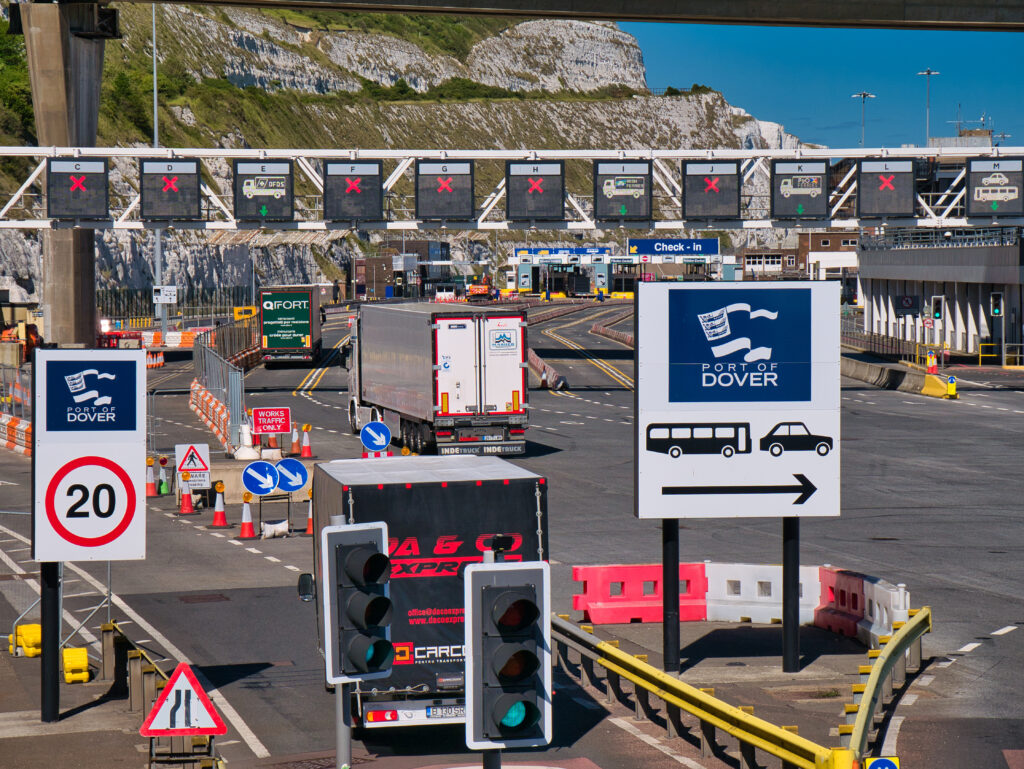Three years after our formal exit from the EU, and after five delays in their implementation, new border controls finally came into effect for animals, plants and plant products imported to Great Britain from the EU.
But while this is a source of relief within the industry, there are concerns about the implementation of the new Border Target Operating Model (BTOM), including proposals to cut funding for illegal meat checks at Dover to fund it.
The new system is being phased in over the year. Products which present a ‘medium risk’ to biosecurity and health, from January 31, now require export health certificates and phytosanitary certificates, where previously they enter the UK without them.
The risk-based controls also mean that imports from all countries will be assessed the same way, where ‘high-risk’ products undergo necessary checks, and ‘low-risk’ products are imported more freely when it is safe to do so.
The BTOM will aim to minimise burdens for traders by making smart use of data and technology. Health certificates are being digitised and simplified, where currently they are paper-based and complex. The Single Trade Window will remove the need for traders to provide the same data multiple times, and Trusted Trader schemes will significantly reduce controls for our most credible traders.
Controls are being applied on goods from Ireland for the first time. However, thanks to the Windsor Framework, Northern Ireland (NI) goods will benefit from full and unconditional unfettered access, regardless of whether they move indirectly via Ireland.
In designing the BTOM, Government said it consulted thousands of stakeholders through events, focus groups and through written correspondence, with ongoing communication with industry since.
Phased implementation
The controls coming into place this week are the first three steps in implementing the BTOM.
- From 30 April 2024, Government will introduce documentary, physical and identity checks at the border for medium risk animal products, plants and plant products imported to Great Britain from the EU except goods that enter Great Britain via West Coast ports.
- 31 October 2024, Government will further simplify traders’ management of Sanitary and Phytosanitary requirements. Safety and Security declarations will also be required for all goods moving from the EU to Great Britain. These controls were announced in the Border Target Operating Model in August 2023, which sets out a risk-based approach to importing that will be introduced progressively.
Baroness Neville-Rolfe, Minister of State at the Cabinet Office, said: “Our aim is to have border controls which maximise the protection of the UK population from harms such as drugs and animal and human diseases while minimising the disruption to legitimate trade.”
Biosecurity Minister Lord Douglas-Miller said: “Border controls on imported goods are vitally important to safeguard our high biosecurity standards, protecting the UK from potentially harmful pests and diseases, and maintaining trust in our exports.
“These checks must also be proportionate and pragmatic – which is why we’ve taken a phased approach to implementing the new system and are working closely with industry to help them prepare. The controls introduced today strike the right balance between trade and biosecurity.”
Wider concerns
However, as first reported by Pig World, serious concerns have been raised about some of the changes being made to implement the BTOM. These include proposed cuts of up to 70% in the budget for illegal meat checks at the Port of Dover, specifically introduced to keep African swine fever (ASF) out of the country, and a decision to move the Border Control Post for customs checks from Dover 22 miles inland to a site at Sevington, near Ashford.
Sir Robert Goodwill, chair of the Environment, Food and Rural Affairs Committee, has written to Defra Secretary Steve Barclay to express ‘serious concerns’ over these two issues.
Lucy Manzano, head of port health & public protection at the council, described the cuts at Dover as potentially ‘disastrous’ for the UK pig sector, while NPA chief executive Lizzie Wilson said cutting this budget could be ‘catastrophic’ for the pig sector.
Shadow Farming Minister Daniel Zeichner said cutting funding to those trying to stop this illegal trade would be ‘both foolish and dangerous’.
NFU President Minette Batters said: “British farmers and growers need controls on all imports, including those from the EU, to be effective, bio-secure and efficient. That looks different for the individual sectors in agriculture dependent on business need, therefore it is essential that the new controls are implemented in a way that recognises those different needs and nuances.”
Brittish Meat Processors Association chief executive Nick Allen said cutting back of resources at Dover would be ‘extremely concerning from a disease threat point of view’.
He cited other potential teething problems his members have experienced with the introduction of the BTOM. “I am not saying it’s a disaster, but there is clearly a lot of work still to do,” he said just prior to implementation.
Jason Aldiss, head of external affairs at the Association of Independent Meat Suppliers (AIMS), said the proposed import controls will not reduce the ASF risk because they are ‘essentially designed for the compliant trader’.
“The compliant will continue to comply and the illegal traders will continue to trade illegally. The ‘new controls’ will simply put up cost, slow down transit and add to food inflation,” he said.




